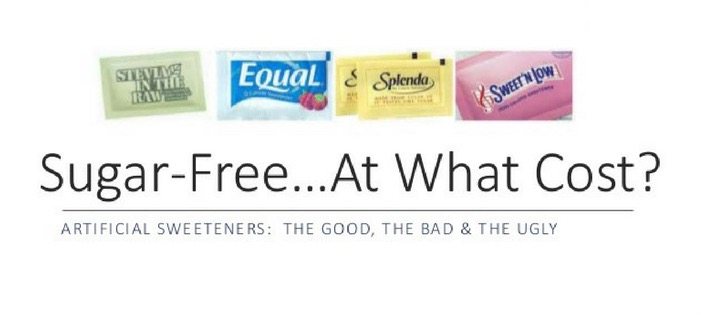Say No To Splenda
Through they have all been approved and declared “safe” for human consumption, there is a lot of controversy and potential health risks associated with artificial sweeteners, which include aspartame (Equal and NutraSweet), saccharin (Sweet ‘N Low) and sucralose (Splenda).
Let’s start with aspartame, also known as NutraSweet and Equal. As of 1994, 6,888 cases of adverse reactions from aspartame had been reported to the FDA, enough to make up a staggering 75% of all non-drug complaints – more than any other food ingredient in the agency’s history. Aspartame is an excitotoxin, which is a toxic substance that in high concentrations may stimulate nerve cells so much that they are damaged or killed. It is composed of aspartic acid, methyl ester (which breaks down to formaldehyde and formic acid) and phenylalanine. Those are scary words, right? They point to one thing: that they are acid-forming in the body!
Think aspartame can help you lose weight? Think again. despite the fact that it has zero calories, studies have shown that aspartame can in fact induce weight gain. Some researchers believe that the 2 main ingredients in aspartame, phenylalanine and aspartic acid, stimulate the release of insulin and leptin, hormones that instruct our bodies to store fat. One study showed that when we ingest a large amount phenylalanine, it can drive down our levels of serotonin, which is the neurotransmitter that tells us when we’re full. A low level of serotonin can also bring on food cravings.
Saccharin, aka Sweet ‘N Low, is no better in this regard. A study at Purdue University’s Ingestive Behavior Research Center concluded that consuming foods sweetened with saccharin leads to greater weight gain and body fat than eating the same foods sweetened with sugar.
What about the new popular sweetener sucralose, aka Splenda? Researchers from the Duke University Medical Center published a study in the Journal of Toxicology and Environmental Health that showed that sucralose lowered good bacteria in the intestines by 50% and contributed to an increase in body weight in lab studies.
the best bet is to avoid all these artificial sweeteners and all products that contain them; there are too many potential health risks. The better choice for calorie-free sweetener is stevia, which is a natural herb that has been used for hundreds of years in South America and grows naturally in parts of Paraguay and Brazil. It is widely available in the marketplace today. Another good choice is xylitol, a lower calorie, low-glycemic substitute that is a sugar alcohol that occurs naturally in the fibers of many fruits and vegetables. Xylitol is contained in some chewing gums, and it may help reduce cavity-causing bacteria in teeth. If you find that stevia tastes bitter, xylitol may be a better option.

